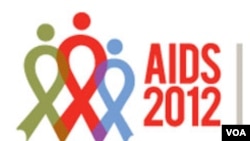About 20,000 people from more than 200 countries are expected in Washington for the 19th International AIDS Conference. It’s the first time the world’s largest AIDS-related gathering will be held in the U.S. in more than 20 years.
The U.S. has been the leading force in funding and scientific expertise in the battle against HIV/AIDS. Conference co-chair, Dr. Elly Katabira of Uganda, says he’ll use the occasion to say, “Thank you.”
“We want the world to know how we appreciate the contribution of the American people. We know that we haven’t been going to the U.S. for the last 22 years, but in spite of that [the] U.S. is still the leading contributor to the struggle against the epidemic,” he said.
The U.S. hadn’t hosted the conference in so long due to a travel ban on those who were HIV positive. In 1987, the Department of Health and Human Services added HIV/AIDS to its list of communicable diseases. Critics say the ban was based on fear and ignorance. The effort to lift the ban began during the Bush administration and was finalized under President Obama in 2010.
Dr. Katabira is an associate professor of medicine, president of the International AIDS Society and co-founder of TASO, the leading Ugandan AIDS support organization. He says the theme of AIDS 2012 is Turning the Tide Together.
“We need to take advantage of what we know to turn the tide together against this epidemic and get rid of it,” he said.
He said the world can no longer afford “the impact and economic wastage associated with the epidemic.” Katabira took the job as international chair at a time of global economic downturn and much talk of budget cuts.
Related video report by Carol Pearson
“The concern is still there,” she said, “but I think our conference will make a difference to show that we’ve made a lot of investments from the amount of support we had over the years. And still we need more investment to conclude what we have achieved today. And I’m sure this will go a long way to convince donors to give more, because knowing what they are going to give out will be used properly to achieve more outcomes than expected.”
When addressing the opening of the AIDS conference, Katabira said he’ll warn of two ongoing problem areas. First, he said, young people are not taking the epidemic as seriously as past generations. He recommended media prevention campaigns targeted specifically at youth. Next, he warned that stigma, discrimination and anti-homosexual laws are preventing treatment and prevention programs from reaching men who have sex with men and transgenders.
The U.S. co-chair of AIDS 2012 is Dr. Diane Havlir. She’s professor of medicine and chief of the HIV/AIDS Division at the University of California at San Francisco. The conference will be held in Washington from July 22nd to the 27th.
The U.S. has been the leading force in funding and scientific expertise in the battle against HIV/AIDS. Conference co-chair, Dr. Elly Katabira of Uganda, says he’ll use the occasion to say, “Thank you.”
“We want the world to know how we appreciate the contribution of the American people. We know that we haven’t been going to the U.S. for the last 22 years, but in spite of that [the] U.S. is still the leading contributor to the struggle against the epidemic,” he said.
The U.S. hadn’t hosted the conference in so long due to a travel ban on those who were HIV positive. In 1987, the Department of Health and Human Services added HIV/AIDS to its list of communicable diseases. Critics say the ban was based on fear and ignorance. The effort to lift the ban began during the Bush administration and was finalized under President Obama in 2010.
Dr. Katabira is an associate professor of medicine, president of the International AIDS Society and co-founder of TASO, the leading Ugandan AIDS support organization. He says the theme of AIDS 2012 is Turning the Tide Together.
“We need to take advantage of what we know to turn the tide together against this epidemic and get rid of it,” he said.
He said the world can no longer afford “the impact and economic wastage associated with the epidemic.” Katabira took the job as international chair at a time of global economic downturn and much talk of budget cuts.
Related video report by Carol Pearson
“The concern is still there,” she said, “but I think our conference will make a difference to show that we’ve made a lot of investments from the amount of support we had over the years. And still we need more investment to conclude what we have achieved today. And I’m sure this will go a long way to convince donors to give more, because knowing what they are going to give out will be used properly to achieve more outcomes than expected.”
When addressing the opening of the AIDS conference, Katabira said he’ll warn of two ongoing problem areas. First, he said, young people are not taking the epidemic as seriously as past generations. He recommended media prevention campaigns targeted specifically at youth. Next, he warned that stigma, discrimination and anti-homosexual laws are preventing treatment and prevention programs from reaching men who have sex with men and transgenders.
The U.S. co-chair of AIDS 2012 is Dr. Diane Havlir. She’s professor of medicine and chief of the HIV/AIDS Division at the University of California at San Francisco. The conference will be held in Washington from July 22nd to the 27th.




